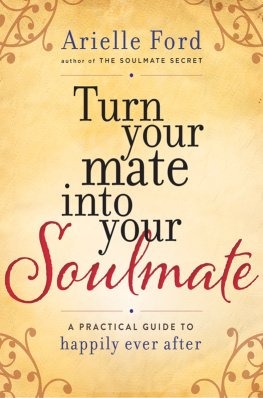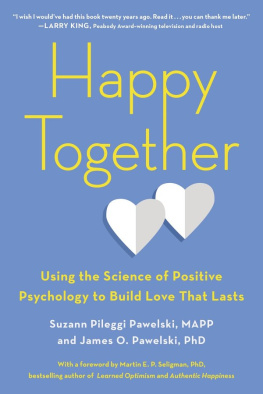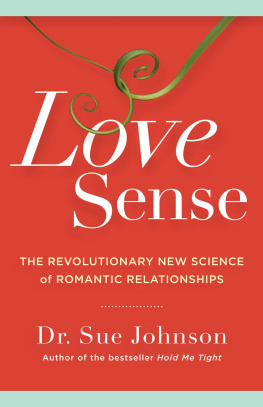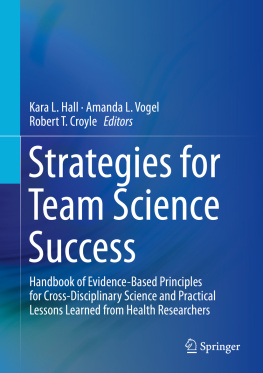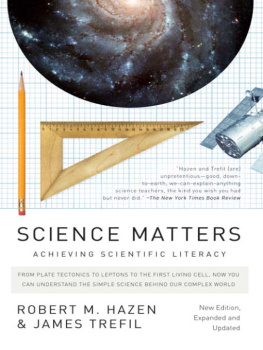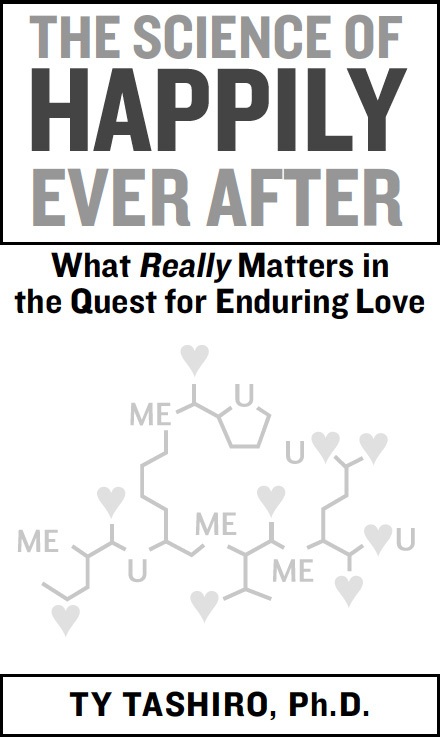
To my mom and dad, for being happy and loyal in every way imaginable.
CONTENTS
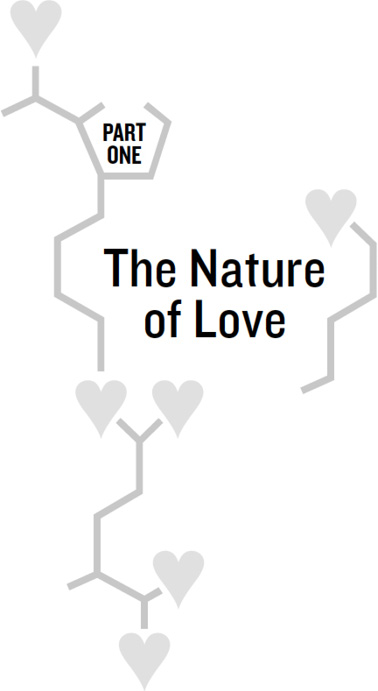
CHAPTER 1
Why Happily
Ever After Is
So Hard to Find
I met Grant at a time in his life when he could not stop worrying. It would have been difficult to know from casual observation that Grant was beset by anxiety. Just a freshman, he was already revered by the engineering faculty for his ability to dismantle complicated scientific problems. His boyish looks, lanky build and crackling voice made his stunning intellect seem all the more precocious. Grant quickly made many new friends, who were endeared by his old-school politeness, good-natured temperament and even the occasions when he could be socially clumsy. However, when his mother passed away unexpectedly, the loss sent Grant into a state of constant anxiety. His high-powered brain spun his worries so rapidly and tightly that he found it difficult to move forward in his schoolwork and his social life. For some reason, the one thing that did not seem to worry him was the intern assigned to be his therapist: me.
I was beginning my second year of graduate school in psychology at the University of Minnesota, and Grant was one of my first clients. During our weekly meetings, Grant showed rapid progress as he dutifully followed the anxiety treatment protocols. For our sixth session, the protocol called for a public outing, and Grant suggested that we walk to a nearby coffee shop. We stepped outside into a blustering minus-ten-degree wind chill and pulled the hoods of our puffy coats tightly around our faces as Grant shared his good news.
Earlier in the week, while perusing old science books at a used bookstore, he saw an attractive young woman looking at old philosophy books in the same aisle. There are few social situations as anxiety provoking as trying to initiate a romantic encounter, and Grants mental centrifuge started to spin. Before his anxieties could gain much momentum, she was walking toward him and asking about the book in his hand. They spent the next thirty minutes enthusiastically discussing philosophy and science. Grant was smitten. He was still describing the wonder that was Emma when he opened the door to the coffee shop, began walking inside and then suddenly stopped.
In one seamless motion, Grant whirled around, pushed me out the door and strained to whisper in his crackling voice, Sir! Shes in there!
Whos in there?
Emma! She must work here.
Ah, jeez. What should we do?
I dont know! Youre the psychologist.
Right...
We sat down on a bench to regroup. In the cold air, I could see Grants breathing following a cadence of three breaths in, four breaths out, the same cadence I had taught him to employ when dealing with oncoming panic attacks. As Grants anxiety rose, I took a deep breath, turned to him and put my hand on his shoulder in the most fatherly way I could imagine. Having no idea what a skilled therapist might instruct a client to do, I asked, You want to do this?
Grant thought for a brief moment, and then he stood up. He pursed his lips with determination, straightened his puffy coat and in his Minnesota accent said, You betcha. We marched inside and stepped into line. As we waited, I peered around the group of fraternity pledges in front of us to get a look at this mysterious Emma. She was an edgy sort of lovely: a hipster with black cargo pants, a well-worn Ramones T-shirt and big brown eyes framed by Tina Feylike glasses. She was moving efficiently, handling the high-maintenance orders and simultaneously engaging in casual banter with her customers.
When the pledges turned away from the register, the most handsome and well polished among them lingered at the counter to flirt with Emma. He looked like an NFL quarterback: tall, strong and confident. For some reason, this situation sparked a primal instinct within me, and I felt compelled to tackle him. Yet, I knew Grant needed to be the one to attack, to be at the counter right now and intervene. When I turned to Grant, he stood frozen.
With only the primitive fight-or-flight instincts of my hindbrain active, my reflexive thought was to kick Grant in the shin. So I did. Like a horse out of the chute, he burst toward the counter, and for a brief moment, I felt a sense of triumph. Here was Grant, charging forward with intent and momentum, on his way to winning Emmas heart, until he tripped. I gasped as he flew forward. When he finally landed, it was chest first on the edge of the counter. As Grant lay there in an awkward, angled plank position trying to regain his breath, the pledge, alarmed by the social awkwardness of the moment, shuffled to the end of the espresso bar.
As Grant lay on the counter, I wanted to pick him up and try to say something to break the awkward silence, but it was not my place. I could only wait and watch. I felt like a coach standing helplessly on the sidelines, watching as his freshman kicker lined up to attempt a game-winning field goal.
What happened next was simply clutch. Grant looked up, gazed directly into Emmas bespectacled eyes and spoke in the timbre of an evening news anchor. Emma, Im Grant. We met at the bookstore the other day. I am captivated by the book you recommended. It is brilliant.
Emma blushed.
Grant made some witty jokes, and she laughed. She made some jokes, and he laughed.
At the end of it all, Emma suggested, We should talk sometime, Grant... you know, about the book.
After the debacle and the brilliant recovery at the coffee shop, Grant and Emma went on three dates over the course of two weeks. All three dates were filled with engaging conversations, ample laughter and a rapidly increasing mutual attraction. However, Grant had not dated much in his lifetime and so how to proceed in a relationship was unfamiliar to him. In our therapy sessions, he asked dozens of questions about love, but the most significant of these was a question he asked me after their third date.
I like Emma a lot.
You do.
I think I should kiss Emma.
You should.
Well, before that, I guess... Am I falling in love with Emma?
Maybe, Grant. But being in love... its pretty complicated.
A LIFE IN LOVE
By the time I entered graduate school during the late 1990s, relationship science, the field devoted to the scientific study of relationships, was burgeoning after decades of researchers struggling against critics who argued that love was too complex to study or that love was a frivolous topic for scientific investigation. The University of Minnesota housed some of the best relationship researchers in the world, and under their guidance, I began to learn about the science of falling in love, staying in love and losing love.
My early research was focused on the endings of relationshipsspecifically, whether relationship breakups or divorce could lead to personal growth that might improve future relationships. In one of our first studies, Patricia Frazier and I asked ninety-two undergraduates experiencing a recent breakup to describe what positive life changes, if any, have happened as a result of your breakup that might serve to improve your future romantic relationships. We found that the average participant reported five positive life changes, which included improved friendships, feeling more self-confident and learning how to better communicate. To our surprise, will choose a better partner in the future was one of the least cited types of growth.
Next page

